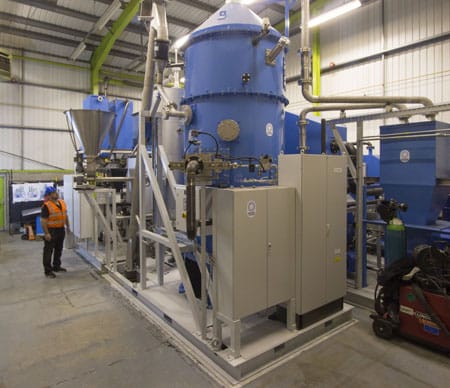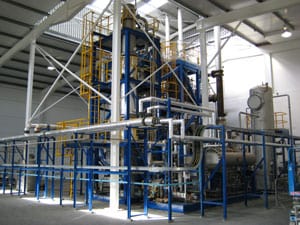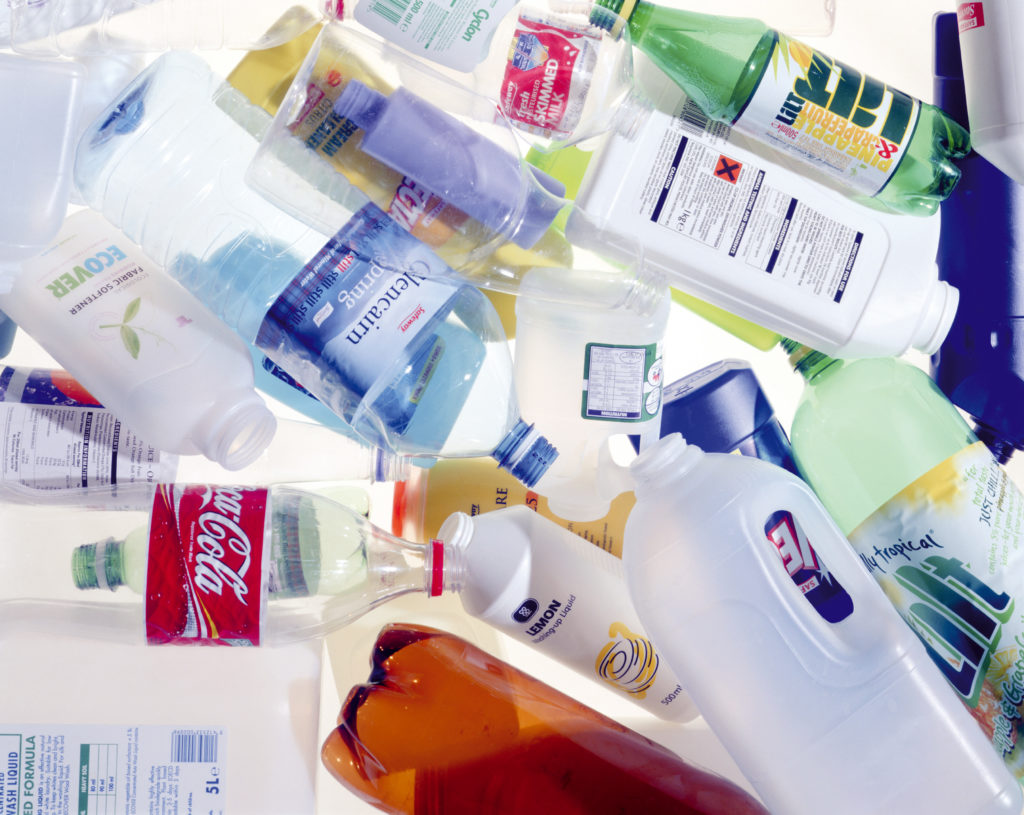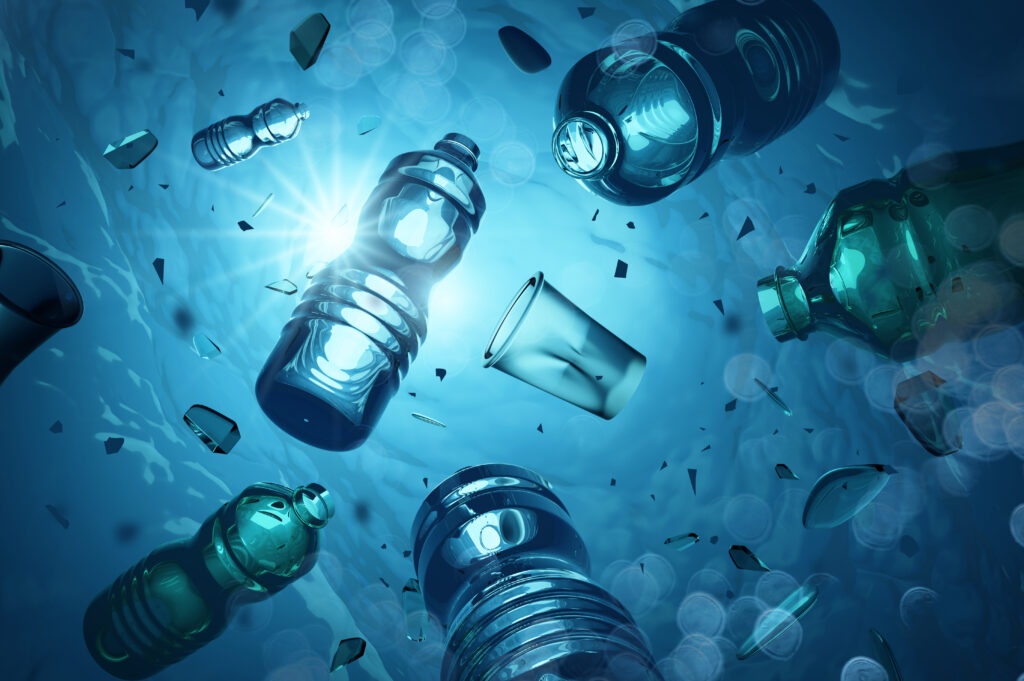And, at the end of February, the company, Recycling Technologies of Swindon, announced the appointment of former Viridor director of engineering, Stephen Hodges, to its “leadership board”.
In terms of feedstock, Recycling Technologies says it has already struck deals with Scottish local authorities, which will see them collect plastic separately to be used for its first formal commercial machine to be constructed in Perth later this year with funding support from Zero Waste Scotland.

Recycling Technologies say the patented technology for its modular machine, called RT7000, can “chemically recycle” all plastics including black food trays, crisp packets and coffee cups, which are renowned for being difficult, impossible or not financially viable to recycle.
Fluidised bed
The system involves shredding material, which is injected into a fluidised bed where polymers are broken down by pyrolysis [high temperature decomposition] to form a gas. The gas is then filtered, cooled and condensed to form what the company has called ‘Plaxx’. This, it explained, can be used to make new plastic products or as shipping fuel which, says Recycling Technologies, has a value of more than £300 a tonne.
The company has also said the machine is able to deal with the traditional problems industry has faced with these types of plastic, including food waste and other contamination.
Scotland has long held a dream for plastics recycling within the country and there has also been talk in the past of turning plastics back into oil at a plant mooted for Grangemouth.
Cynar
In England there have been similar ideas but they have not got off the ground. One of the main ones was a plan in 2010 by SITA UK (now SUEZ) to convert 60,000 tonnes of mixed plastic to diesel. The plans for a plant at Avonmouth did not go ahead although the company signed a deal with Cynar plc to develop plastics to fuel technology developed in Ireland (see letsrecycle.com story).
Speaking to letsrecycle.com, Recycling Technologies’ sales and marketing director, Adrian Haworth, said the RT7000 is different.
“There have been many attempts at such projects before, however nobody has made a model which can in the long-term be distributed and leased out. Projects such as this have to be profitable, not just for the sake of the environment, which has been the problem with previous projects,” explained Mr Haworth.
“We have already confirmed the sale of 30% of the Plaxx we create and the remaining 70% will be announced soon.”

The company has been on record to say they are in talks with a string of major petrochemical firms, and recently announced a £1 million deal with InterChem, which includes the sale of Plaxx to its polymer manufacturing client base.
With the fall in crude oil in recent years, it is often found to be cheaper to use new oil sources for making new plastic products than use recycled plastic. This has led to a lot of mixed lower grade plastic being sent for incineration or landfill.
Mr Haworth added that he hopes to stop all plastic going to incineration in the long-term, although he accepted that certain types of plastic are of an “important calorific value” for EfW plants.
“We have struck deals with councils already across Scotland who have said that they will collect plastic materials separately that we can collect. The intent is to come from all over, from authorities to manufacturers. We want to stop all plastic going to incineration and landfill”.
Funding
Overall, the technology now has over £10 million in funding, according to its creators. This was spread across seven rounds. It also received a £1million grant from Zero Waste Scotland.
Zero Waste Scotland told letsrecycle.com that the £1 million will support the development of an “operational disruptive technology that recycles recovered plastic wastes”.
A spokesperson for Zero Waste Scotland said: “The technology has been developed to showcase that low value plastics can be recovered and kept within the value chain to the benefit of the Scottish economy. The primary focus for the product will be for use in off grid distilleries and within the transport (e.g. Calmac Ferries) network of Scotland as an alternative to heavy fuel oil.”
Verification
Zero Waste Scotland further explained that the feasibility of this project has been “verified independently”, before adding that medium term market development by the company “is to have 17 operational sites across Scotland with global ambitions”.
The Zero Waste Scotland grant came as the company plans to build its first fully operational plant on a site owned by the Binn Group in Perth by the end of 2018.
Recycling Technologies had a pilot machine in its hometown, with Swindon Council offering its facilities to accommodate the near-full scale test plant machine, which is the size of a tennis court.
However, this has now stopped for a refurbishment and to make some updates to the machine before its roll-out in Scotland later this year.
The proposed Scottish facility at the Binn Group site will begin by turning 7,000 tons of plastic waste annually into 5,000 tons of Plaxx, before increasing output, the company has said.
“We are thrilled to have Nicola and Stephen on the board. Their expertise will prove invaluable to our longer-term strategies for the growth and development of Recycling Technologies”
Adrian Griffiths
Chief executive, Recycling Technologies
Mr Haworth says this will initially cost £5 million and a further £0.7 million annually to keep operational and that the company will continue to raise funds to aid its development.
He concluded by saying that in the long-term, a more fine-streamed machine can be leased directly to MRFs or even on beaches to tackle plastic pollution at the source.
Recycling Technologies has also issued a statement saying its recent crowdfunding campaign has closed early due to reaching the investment cap for the seventh round of fundraising.
Appointments
Commenting on the recent appointment of Mr Hodges (ex-Viridor) and also Nicola Frayne, chief people officer at Bill’s Restaurants, Adrian Griffiths, chief executive of Recycling Technologies commented: “We are thrilled to have Nicola and Stephen on the board. Their expertise will prove invaluable to our longer-term strategies for the growth and development of Recycling Technologies and to our current commercialisation and recruitment phases. We are committed to be proud of not only what we do to recycle more plastic waste, but the values which we uphold in taking our business forward.”
Related links
Recycling Technologies












Subscribe for free